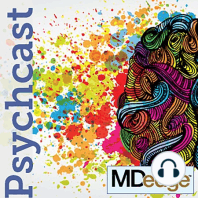23 min listen
Identifying suicide crisis syndrome with Dr. Igor Galynker (Part 1)
FromPsychcast
ratings:
Length:
40 minutes
Released:
Jul 31, 2019
Format:
Podcast episode
Description
Show Notes Igor Galynker, MD, PhD, talks with Lorenzo Norris, MD, host of the MDedge Psychcast and editor in chief of MDedge Psychiatry, about suicide crisis syndrome. Dr. Galynker has been a guest on the Psychcast twice before, once to discuss the impact of suicide on physicians and a second time to talk about his research on the arguments for adding a suicide-specific diagnosis to the DSM-5. He is associate chairman for research in the department of psychiatry at Mount Sinai Beth Israel in New York. In addition, Dr. Galynker is founder and director of the Richard and Cynthia Zirinsky Center for Bipolar Disorder, and professor of psychiatry at the Icahn School of Medicine, both at Mount Sinai. Show Notes by Jacqueline Posada, MD, who is a consultation-liaison psychiatry fellow with the Inova Fairfax Hospital/George Washington University program in Falls Church, Va. Later, in the “Dr. RK” segment, Renee Kohanski, MD, tells the story of a patient who found a way to rediscover his value system against great odds. Dr. Kohanski, a member of the MDedge Psychiatry Editorial Advisory Board, is a psychiatrist in private practice in Mystic, Conn. Suicide crisis syndrome: A suicide-specific mental state Until recently, there was no differentiation between the mental state associated with lifelong suicide risk versus the mental state associated with imminent suicide risk. Jan Fawcett, MD, distinguished these mental states for the first time by differentiating acute risk of imminent death and lifelong risks and traits of suicidal behavior. Lifetime suicide risk factors include mental illness, history of suicide attempts, depression, and substance abuse. Imminent suicidal behavior risk factors include panic, acute anhedonia, agitation, and insomnia. Dr. Galynker and colleagues have identified a condition they call suicide crisis syndrome, which they define as a mental state that predicts imminent suicidal behavior in days to weeks. The predictive validity has been replicated across several cultures and populations. Suicide crisis syndrome: To be identified as having suicide crisis syndrome, the patient must meet both criterion A and two criteria of B. Criterion A: Frantic hopelessness or state of entrapment defined as being stuck in a life situation that is painful and intolerable, and a feeling that all routes of escape are blocked. The risk of suicide within 1 month is 13% for people who meet criteria for suicide crisis syndrome. Criterion B: Affective dyscontrol, including emotional pain or mental pain; severe panic with agitation, and dissociation; rapid mood swings that can include happiness; and acute anhedonia. Cognitive dyscontrol, which can include ruminative flooding associated with headache or head pressure; cognitive rigidity; and inability to suppress the ruminative thoughts. (For example, you might assess by asking: “Do you control the thoughts or do the thoughts control you?”) Overarousal with insomnia and agitation. Social withdrawal and isolation, and evading communication. Why are suicide-specific diagnoses necessary? 75% of people who die by suicide do not report suicidal ideation to a clinician, psychiatrist, or primary care physician. Notably, suicide crisis syndrome does not include suicidal ideation in the criteria, because not all people within imminent risk feel suicidal until the moment strikes. Some patients will hide their suicidal ideation from their clinician to prevent having their plan foiled. Suicide crisis syndrome creates a fuller picture of patient risk. Assessment of the criteria help a clinician consider more risk factors for imminent risk than simply a patient’s self-report about suicidal ideation. Approach suicidality with a different framework Suicide-specific diagnoses represent a profound shift in approach, because suicide is a transdiagnostic phenomenon for depression, bipolar disorder, and schizophrenia. A person can be at imminent risk for suicide without meeting criteria for oth
Released:
Jul 31, 2019
Format:
Podcast episode
Titles in the series (100)
Joseph Pierre: Dual Diagnoses part I: How do you treat patients with dual diagnoses. by Psychcast
